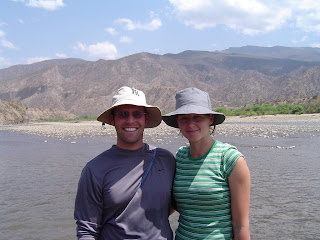Hello all!
Cassie and I are almost halfway through our language classes, and it shows. We’re continually hitting walls and struggling to find words, but every night, we have more complex and fulfilling conversations with our host family. We’re staying with a widow named Consuelo. We’re getting to see middle-class life in Bolivia - very different form Moro Moro. This family has a car and a computer, and even a washing machine. They have traveled to other countries and watch cable television. In the countryside surrounding Moro Moro, we’re often asked what it’s like to fly in an airplane, and how much did my prescription eyeglasses cost. The people are curious and know so much more than I have ever known about plant life and our immediate surroundings, but experiences of technology and life as usual in the developed world is fascinating to them.
We have settled into a routine of language classes 4 days/week in the mornings, and work on thesis, homework, or other projects in the afternoons. I am within a week of finishing edits on my thesis to turn back in. Cassie received word that her publication needs some revision, so she’s hitting the statistical software with gusto to complete that. We’re in and out of the phase of needing a LOT of sleep. At first it was 10 hours EVERY night. At times it’s in bed at 9 and groggy at 8 trying to get out of the house for class, other times I pop up at 6:30 with my head clear.
On the days we don’t have class, we’ve been doing various activities to orient us to Bolivian life. Whether a tour of the city by micro (the bus system here) or talking politics with an American expatriate who’s been living here for 40 years, we’re feeling like we’re getting to know this culture more every day.
A few experiences really throw us for a loop – such as the micros (bus system) here. Not bad, just different we remind ourselves… There are 114 micro routes in/though this city of 1.5 million, and there are 11 different ones that will take us from our house to the MCC office – about a 15 minute ride. The micros have ~20 seats, and are all privately owned, at times by a company, at times by the driver. There are no marked stops, so you just flag down a bus, and ask “PARE (stop) POR FAVOR” if you want off. At times you’re stuck in traffic, and you just have to ask “PUERTA (door) POR FAVOR” and he’ll let you off to fend for yourself in the traffic. I find the incentives built into the system quite interesting. The owner gets to keep the money brought in above and beyond costs – so his goal is to get as many people onto and off of the bus as possible. That means they drive as fast as they possibly can, but if someone flags them down, HOLD ON! And if there’s a few cubic feet of room left in the bus, he’s glad to stop and let you attempt to squish into the bus. Then if someone from the back wants out – that’s another process. It ends up being a fairly efficient system once you’re on a bus, because you get across town in a hurry, but it’s at times uncomfortable. Some of the busses were not meant for tall gringos (not a derogatory term in Bolivia). At 5’8”, I have to shorten myself a good 8” on some micros. If I have to stand for the 15 minutes – ouch.
We haven’t taken any pictures since we arrived in the city – we’ve seen fascinating things, but have been travelling as light as possible. We’re getting more comfortable now and will probably get some pictures of life here uploaded soon.
If you're wondering about homesickness, we're doing alright. A friend just shared her load of downloaded Office episodes, and though we couldn't watch it Thursday night, like so many of you at home, we'll get a few watched this weekend. We're lucky to have lived a fairly transient life since we've been married - staying in the same zipcode 18 months one time. I think it prepared us well to make yet another break from the familiar. As we said a few times before we left - we look back on the road that got us hear and realize how good God is too have prepared us for each next step. We never saw the next journey coming until it was time, and we had been prepared for it. Thanks everyone for your support and chats. Skype is working well - add us to your list and we can videophone online - our username is andyncassie.
Now, if you'd like to eat along with our journey, give Masaco a try:
Need:
½lb beef cut – sliced thin, not ground
2lb bananas or plantains
Fry the meat – really, over-fry it just a little so it’s just a little dry.
Fry the bananas/plantains. Get them really well fried too – just a little dry is fine.
In Bolivia, every kitchen I’ve entered has a “tacu” a hollowed out stump for use as a mortar-pestle devise – mostly for making masaco. You’ll have to improvise. What you need to do is crush the fried meat so that it breaks apart into little slivers.
Remove the meat from the crushing devise, and do the same for the bananas. Add a bit of salt as you crush, and add the meat back to the bananas as you get them smooth. Keep mixing until it’s of even consistency. Now add some of the oil from frying the meat into the mixture – mix until blended.
A few more ideas and a pretty bad picture here: http://www.boliviabella.com/masaco-de-platano.html
Enjoy!























